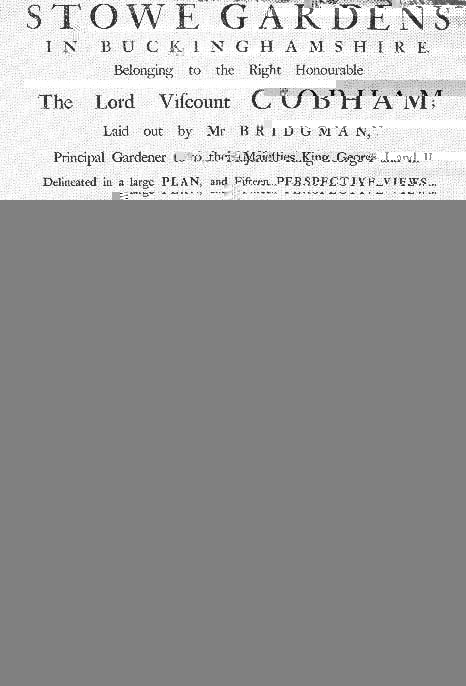
PHILOSOPHICAL CHANGES TO STOWE GARDEN DURING THE 18TH CENTURY
Development from a Geometric Garden to "No man's garden" ...

Willis, Charles Bridgemann, Plate 121
During the beginning of the 18th century, the English garden represented the intrinsic principle of manufactured solidarity of the upperclass. The upperclass wanted to remove themselves from the social scene at Vauxhall and Hampton Court. They rejected the commercialism and restraints of the time by transcending the Dutch- influenced formal gardens into that which represented the natural beauty of the world. Therefore, Stowe Garden beginning with its first gardeners, Bridgeman and Kent, sought to remove all boundaries which restricted the garden. The evolution of the garden didn't stop there though, Vergnaud and Brown expanded the philosophy into what was believed to be the Garden of Eden.
The idea of the English Garden was such a new and unexplored topic, that everyone was searching for a template to follow. They found it in the grounds that surrounded Castle Howard, Stowe Garden. The size and magnificence of the landscaping led many to imitate and view the garden, and for such writers as Pope to write about it. . .
"THE GENIUS"
Consult the Genius of the Place in all;
That tells the Waters or to rise, or fall;
Or helps th' ambitious hill the heav'ns to scale,
Or scoops in circling theatres the Vale;
Calls in the Country, catches op'ning glades,
Joins willing woods, and varies shades from shades;
Now breaks, or now directs, th' intending lines;
Paints as you plant, and, as you work, designs.
Still follow Sense, of ev'ry Art the Soul,
Parts answ'ring parts shall slide into a whole,
Spontaneous beauties all around advance,
Start ev'n from Difficulty, strike from Chance;
Narture shall join you; Time shall make it grow
A Work to wonder at - perhaps a STOWE.
-Pope, Epistle to Burlington
But now you may be wondering who this GENIUS is that Pope is talking about. Although Pope was referring to one particular gardener, there were actually three gardeners who had a profound influence in shaping Stowe Garden.
INITIATION (Breaking of Renaissance tradition)
EXPANSION (Natural gardening revolution)
Now that you have learned about the philosophy behind the designing of Stowe, to learn more about present day Stowe and the 18th century, click here .